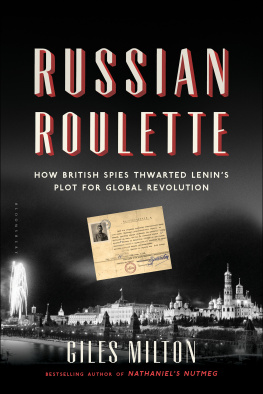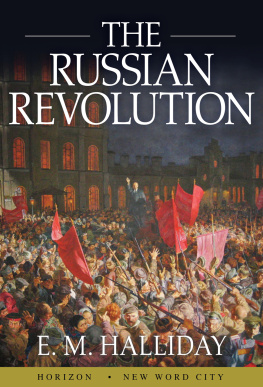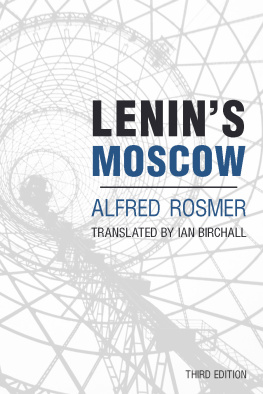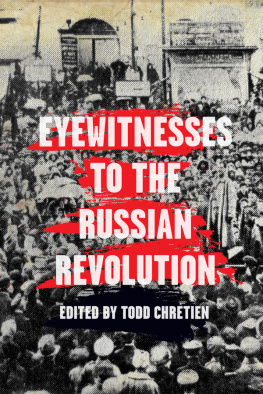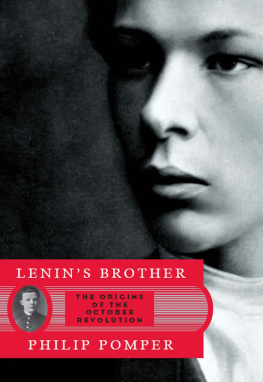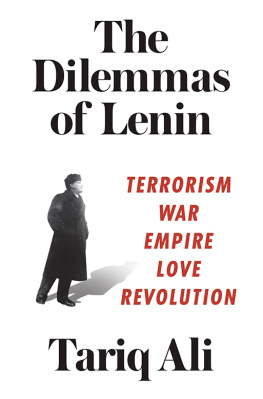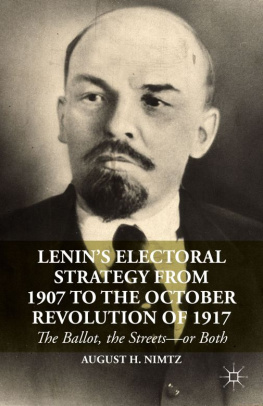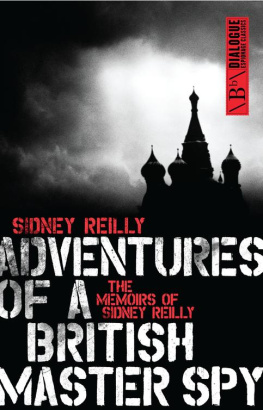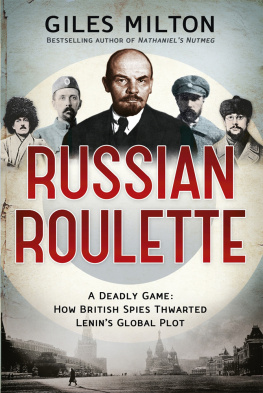Giles Milton is a writer and historian. He is the bestselling author of Nathaniels Nutmeg , Big Chief Elizabeth , The Riddle and the Knight , White Gold , Samurai William , Paradise Lost and, most recently, Wolfram . His books have been translated into 18 languages. White Gold is currently being piloted as a major Channel 4 series.
He has also written two novels and three childrens books, two of them illustrated by his wife Alexandra. He lives in South London.
www.gilesmilton.com
Praise for Russian Roulette
Just when it seemed there were no more rousing espionage stories left to tell, along comes Giles Milton with Russian Roulette. With his customary panache and originality, he weaves an astonishing account enlivened by a remarkable cast of characters. Laurence Bergreen, author of Columbus: The Four Voyages and Over the Edge of the World: Magellans Terrifying Circumnavigation of the Globe.
Impressive... [An] entertaining history of spectacular, often nasty derring-do by real-life secret agents. Publishers Weekly
Miltons vivid presentation... will entertain aficionados of intelligence. Booklist
Wonderful... Very readable... An entertaining one-stop-shop book that introduces readers to the turbulent years of the Russian Revolution and the new great game of intelligence run by the British and the Soviets. Tish Wells, McClatchy
Acclaim from the British press:
Giles Miltons fast-packed account of Britains attempts to sabotage Lenins revolution reads like a madcap thriller... Milton has synthesised and filleted a mass of materialold memoirs, official archives and newly released intelligence filesto produce a rollicking tale... which explains the long war against Russia with verve, wit and colour. It reads like fiction, but it is, astonishingly, history. The Times
This gripping history of derring-do and invisible ink brings to life the exploits of the British spies who waged war against Russia during the Cold War... Full of novelistic flourishes... [readers] will find themselves as gripped as they would be by the very best of Fleming or le Carr. The Sunday Times
A terrific story, told with Miltons customary fluency and eye for detail. Mail on Sunday
Milton is a compulsive storyteller whose rattling style ensures this is the antithesis of a dry treatise on espionage. And unlike 007, its all true. Daily Express
Miltons team of spies survived their missions [and] his chronicle of their secret war reads not only like a nail-biting thriller, but a success story... Hes helped by a cast of colourful characters whose real-life exploits are a Bond novel beyond Ian Flemings wildest dreams. History Today
Much of the research material for Russian Roulette is housed in two depositories of archives: The India Office Records, now kept at the British Library, and the National Archives at Kew.
Special thanks are due to the ever-helpful staff of the India Office Records. They proved invaluable in guiding me through the 751 files of Indian Political Intelligence. They also provided access to Frederick Baileys photographic collection: two of his photographs are reproduced in the plate section of this book.
The staff of the National Archives proved helpful in locating key documents. The pictures of the M Device, also reproduced in the plate section, were found in one of the National Archives many files concerning the development of chemical weapons.
Thank you to the Institute of Historical Research.
The librarians of the London Library, where much of this book was written, have proved as helpful for Russian Roulette as they were for all my previous books.
A full list of sources is provided at the end of this book but special mention must be made of one author whose works have proved particularly inspiring. The doyen of Great Game specialists is Peter Hopkirk, whose books combine serious scholarship with page-turning narrative. Although new material has come to light in recent years, they remain a standard (and invaluable) reference for the subject of the struggle for control of Central Asia.
I am indebted to those spies who elected to publish their experiences, risking costly law suits for doing so. There is scarcely a page . . . that does not damage the foundation of secrecy upon which the Secret Service is built up. So reads a Secret Intelligence Service memo concerning the publication of Compton Mackenzies book Greek Memories , with its account of Mansfield Cumming.
First-hand accounts must be treated with caution: my aim throughout was to corroborate and balance the sometimes exuberant stories of the spies undercover adventures with the more sober tone of their intelligence reports.
Thank you to my literary agent, Georgia Garrett, for her hard work and ever-helpful advice; and to her team at Rogers, Coleridge and White.
Thank you, equally, to my editor, Lisa Highton, for her excellent advice, encouragement and supportiveness, and for seeing the project through from inception to publication.
Thanks are also due to Federico Andornino, Juliet Brightmore (for her work on the plate section) and Tara Gladden, who copy-edited the book.
I would like to single out my French editor, Vera Michalski, for special mention. She embraced the project from the outset and bought the French (and Polish) rights long before the book was completed.
Thank you, also, to the other foreign editors who will be publishing the book, notably Peter Ginna at Bloomsbury USA and Sindbad editors in Russia.
Lastly, a fanfare of thanks must be sounded for the home team: Alexandra, who read countless versions of the manuscript yet still managed to provide excellent (and much-needed) advice; and to Madeleine, Hlose and Aurlia for reminding me that there is life outside the world of espionage, skull-duggery and dirty tricks.
Magny, spring 2013.
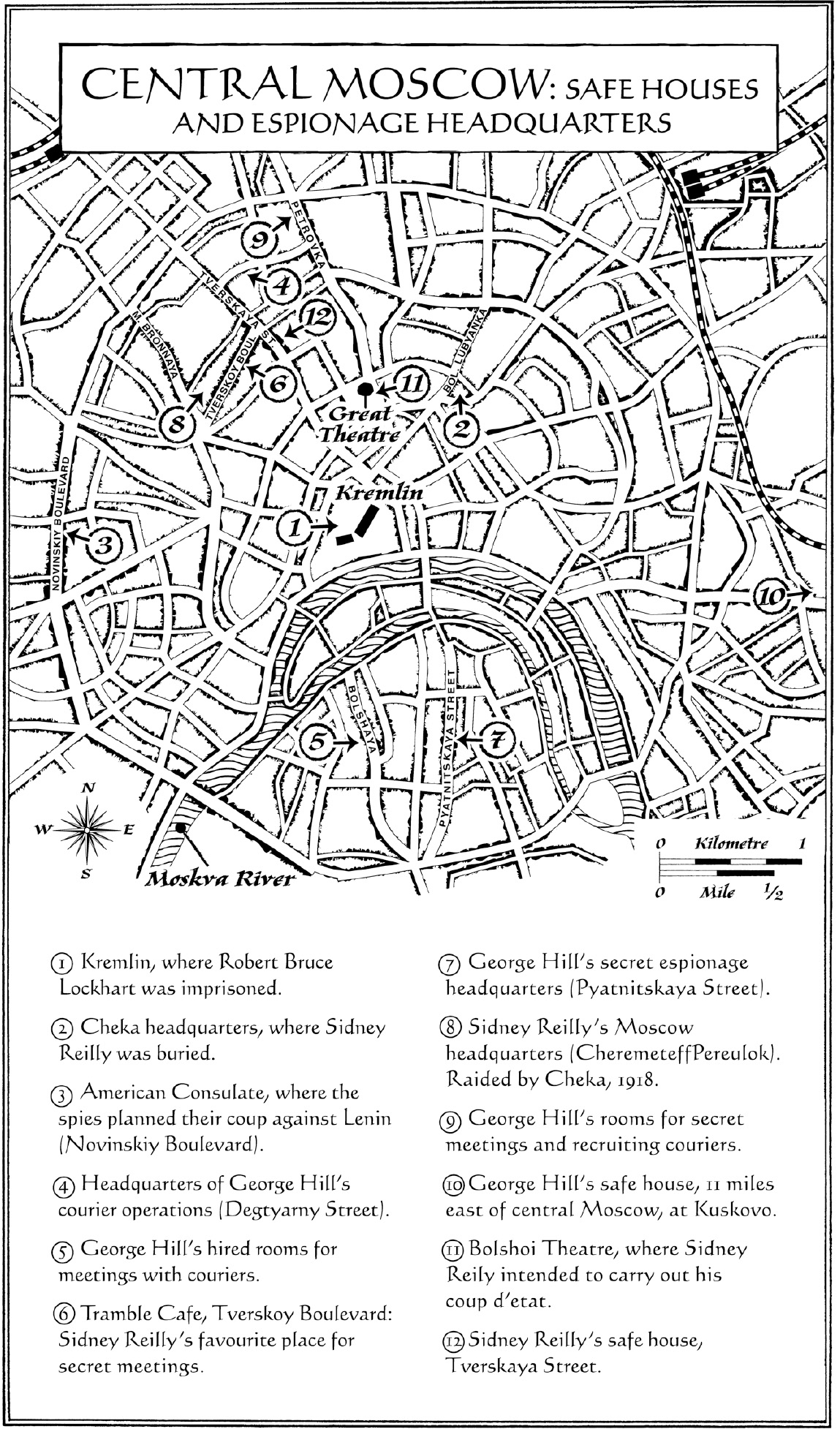
GOING UNDERGROUND
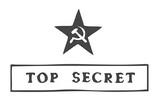
Sidney Reilly and George Hill found Moscow increasingly dangerous in the days that followed the landing of Allied forces in Northern Russia.
The Bolshevik leadership was incensed by what had taken place and was already calling it an invasion. In reality, it was not an invasion at all. A mere 1,500 men had been put ashore and their goal was to secure the stockpiles of unused weaponry, not to attack the Bolsheviks. Yet it had led to a swift reaction from Lenin and Trotsky. The raid on the Western consulates on the day of the landings was a clear sign that Bolshevik Russia was now a hostile power.
George Hill had been preparing to go underground for many months. Yet when the time finally came, he felt a sudden panic. I had a momentary but first-class attack of nerves, he wrote. In half an hour, I should be a spy outside the law with no redress if caught, just a summary trial and then up against a wall.
He took a few deep breaths to calm himself down. Then, after convincing himself that he was doing the right thing, he prepared to leave his flat and begin a wholly new life, taking a last glance at the treasured possessions he was leaving behind: My hat and sword, my photographs and favourite books, one or two prized decorations, various small things I had bought to take back to England . . .
He abandoned his Mauser and his Webley-Scott revolvers, reasoning that they would serve him no purpose. Nine times out of ten, a revolver is of no earthly use and will seldom get a man out of the tight corner. He much preferred his trusty swordstick, which he had wielded to deadly effect several months earlier.
Next page
